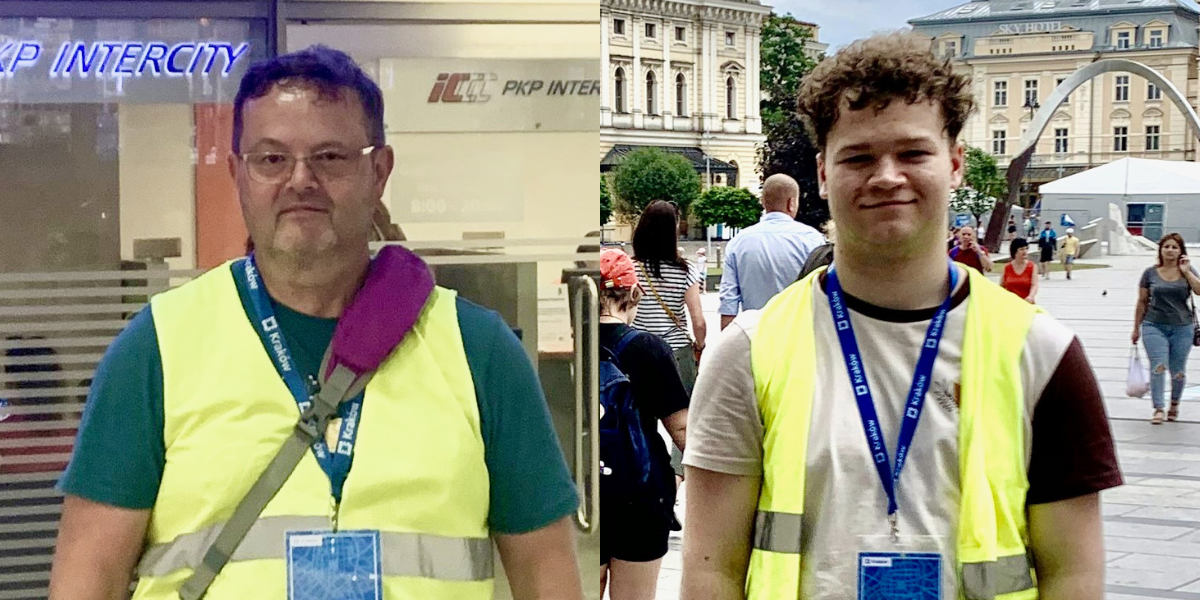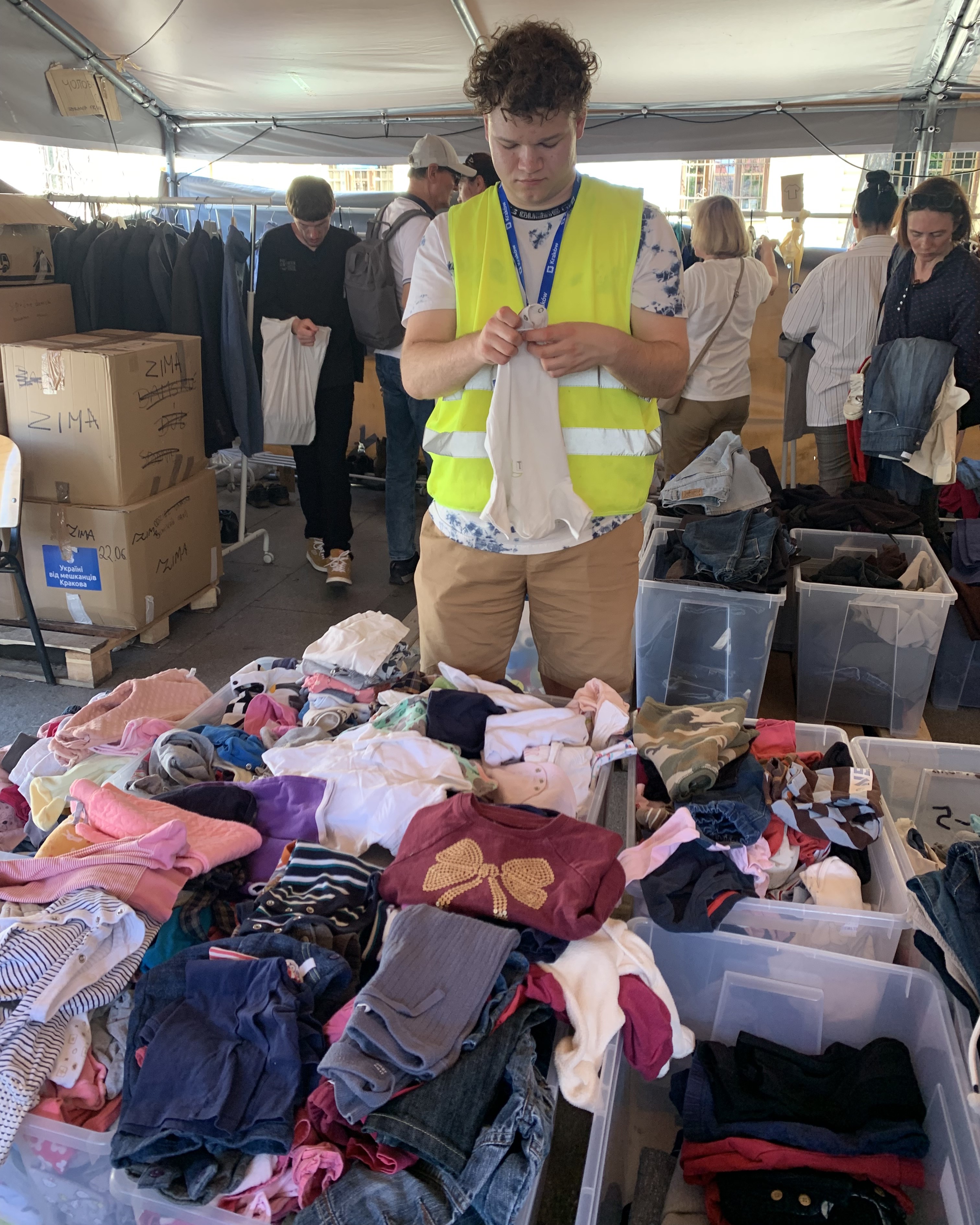Engineering professor and son travel to Poland over the summer in support of Ukrainian refugees
Donna McKinnon - 25 January 2023

Arriving in Poland on June 22, 2022, Derek Apel and his son Dominic headed straight to a relative’s home in Kraków to prepare for their first day as volunteers with the city, which had been overwhelmed by the thousands of Ukrainian refugees fleeing their war-torn country, often with very few possessions or resources.
Derek Apel, a mining engineer in the Department of Civil and Environmental Engineering, was already planning a research trip to the AGH University of Science and Technology in Kraków, when his son, an undergrad in Biological Sciences, suggested that he not only come along, but that they use their time to volunteer with the refugee effort.
“We were all overwhelmed with the news of human suffering coming from Ukraine,” says Derek, who was born in Poland but emigrated to Canada in 1990. “However, it was Dominic who contacted someone from the City of Kraków and was told that the yellow volunteer's vests would be waiting for us when we arrived. Dominic planned to volunteer full-time, and I hoped to combine research work with weekend volunteering.”
They stayed for two and a half months.
Since February 24, 2022 more than nine million refugees from Ukraine have crossed the Polish border, many of them stopping, at least temporarily, in Kraków, the country’s second biggest city with a population of 800,000, which now swelled to over one million.
“Initially, we did manual labour such as distributing donated clothes and food to the refugees, or at the shelter, where the refugees were sent upon arrival,” says Derek. “When they learned that between us, we also spoke Russian, English and French — and Ukrainians would often be able to communicate in one of those languages — we were assigned to work at the train station.
 The Kraków Glowny (main) Railway Station, completely rebuilt in 2014, had become an artery for the thousands of refugees as they made their way to the city and other locations. The old station building, dating from 1847, was south of the new station's platforms and had been converted to temporary shelter for the refugees.
The Kraków Glowny (main) Railway Station, completely rebuilt in 2014, had become an artery for the thousands of refugees as they made their way to the city and other locations. The old station building, dating from 1847, was south of the new station's platforms and had been converted to temporary shelter for the refugees.
Derek and his son helped people buy train tickets, carry luggage or direct individuals and families to government or volunteer organizations as needed.
It was a herculean task, bolstered by the City of Kraków and other government agencies in place, but also the Red Cross, Doctors Without Borders, various restaurants, and private citizens who joined Derek and his son as volunteers — donating time, food, clothing, medical assistance and even the occasional car.
“It was impressive to see how much effort was put into accommodating the refugees,” says Dominic. “They uprooted their entire lives, trying to fit as many things as possible into their luggage. Some had only the clothes on their backs, so there were booths for everything, including a daycare for children and even an animal shelter.”
“The refugees were given the same status as citizens of Poland,” adds Derek. “The moment they arrive, they are registered and given a health card and a social insurance number, so they can go to a doctor, seek employment, open bank accounts, whatever they need.”
One of their jobs at the nearby shelter was to prepare bedding and sort donated clothing by size. After a few days of organizing heaps of trousers, sweaters, and other items of clothing, as people dropped by Derek and Dominic knew immediately what size they would need.
“We learned valuable skills,” laughs Derek. “I could have another profession working in a clothing store. We were also pretty fast with cleaning.”
We Felt Most Sorry For the Old People
Initially, most of the refugees had come from Western Ukraine, where the dominant language is Ukrainian. As this part of Ukraine was liberated, many refugees returned home. By the time the Apel’s arrived in Kraków, the majority of the refugees were from the eastern part of Ukraine, where Russian is more widely spoken.
Derek had learned Russian as a schoolboy in Poland, so he was able to help translate, but many Ukrainians preferred to converse in sign language rather than speak Russian.
“Somehow,” says Derek. “We were able to get things done.”
One of the reasons that Poland was so welcoming, besides proximity, explains Derek, is the demographics of the fleeing population, the majority of which were women and children. The men, particularly the younger men, stayed behind to fight in the war.
““The Ukrainian kids — they could speak fluent Polish within a couple of months, with hardly any accent,” says Derek. “It’s not a huge problem to integrate young people into society, but for the people who were already retired, who were enjoying the fruits of their labours, they suddenly lost everything.”
“One older gentleman I was talking to said ‘yeah, they’re shooting at us and Poland has been great, but Ukraine is my home’, so I helped him buy tickets to go back, almost to the frontline in the Donbas area. That’s something you don’t see on the news — the faces, the individuals and their stories. We felt most sorry for the old people.”
Prior to the war, Poland had been experiencing a labour shortage and so there was already a significant number of Ukrainian men working in the trades, but as they returned to their country to fight, Ukrainian refugee women filled many of these roles.
As the two explained, in addition to the trades, the impact of the Ukrainian refugees could also be felt culturally, as they would often hear Ukrainian music on the streets of Kraków, occasionally performed by classical musicians who had also fled their country.
“We really enjoyed walking around the old, more colourful part of Kraków, which is always packed with tourists and people from all over the world, but this year, we had Ukrainians,” says Derek. “They came seeking refugee status in Poland, but they also benefitted Poland by enriching the culture. The circumstances weren't the best but most people, I believe, were happy to have them here.”
Now back at school, where he is finishing up a degree in biology (with a minor in chemistry) Dominic says he will return to Kraków as a volunteer this summer if he is needed.
“I hope it’s not an issue, but if it’s still occurring, 100 per cent I will go back,” he says. “To see the families ripped apart, whether because lives were lost, or their husbands or sons or brothers stayed behind, or just leaving their entire lives just to escape the conflict — that’s going to leave a big impression. Our jobs as volunteers was to try and make their arrival and stay in Poland as seamless and as comfortable as possible. Because it's an exhausting journey, it’s emotional and stressful. We tried to make that easier.”